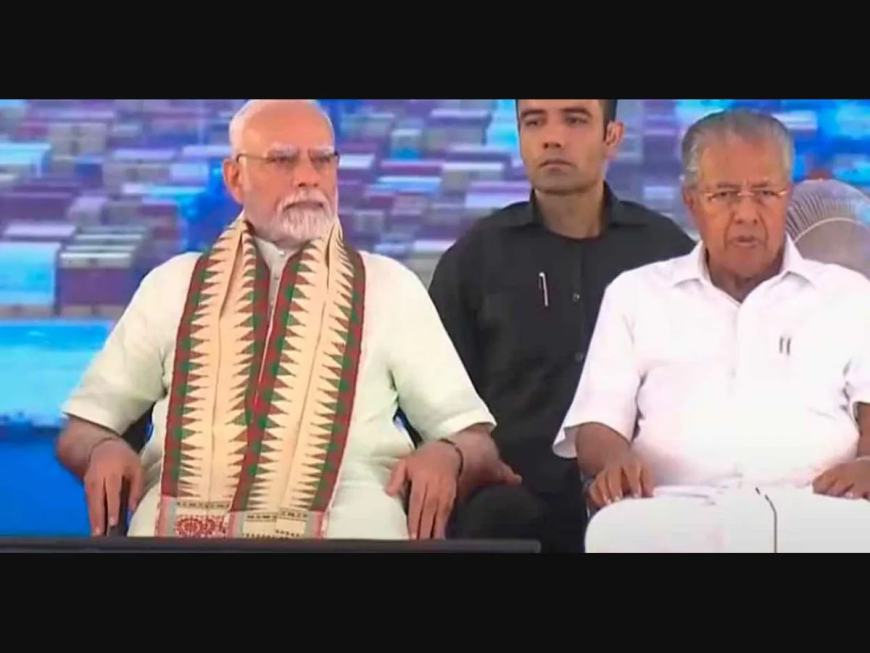PM Modi at Vizhinjam Port Launch: Gujarat's Reaction to Adani and What It Means for the Future
At the official inauguration of the Vizhinjam Port, Prime Minister Modi’s comments stirred discussions about Gujarat’s response to Adani. Explore the political context, potential implications, and the future of Adani’s projects in Gujarat. Understand the dynamics between PM Modi, the Adani Group, and Gujarat in this insightful article.

PM Modi at Vizhinjam Port Launch: Gujarat's Reaction to Adani and What It Means for the Future
The inauguration of the Vizhinjam Port in Kerala by Prime Minister Narendra Modi has become a significant moment, not just because of the monumental infrastructure project but also due to the comments made about the Adani Group and Gujarat. In his speech, PM Modi raised eyebrows with remarks about Gujarat's possible reaction to the involvement of the Adani Group in major projects, leading to discussions and speculations about the political and business dynamics in the state.
While the remarks were seemingly casual, they carry political undertones that are being closely scrutinized by both industry watchers and political analysts. This article delves into the context of PM Modi’s statements, the role of the Adani Group in large infrastructure projects, and the possible implications for Gujarat and the country at large. Let’s break down what Modi’s words mean and explore why Gujarat’s response might be key to understanding the future of Adani’s projects.
The Vizhinjam Port Inauguration: A Milestone for Kerala
Before diving into the political aspects, it's important to understand the significance of the Vizhinjam Port project itself. Located in Kerala, the port is a state-of-the-art international transshipment hub designed to handle large volumes of cargo. The port is expected to boost Kerala's economy, create thousands of jobs, and enhance India’s position in global maritime trade.
-
Strategic Importance: The port’s geographical location offers direct access to key international shipping lanes, providing a much-needed upgrade to India's coastal infrastructure.
-
Economic Impact: The project is expected to facilitate better trade flows, lower logistics costs, and contribute significantly to Kerala’s economic development.
-
Adani's Role: The Adani Group has played a pivotal role in the development of the port, with the company overseeing its construction and operations. This partnership has brought the group’s business interests into the spotlight, raising questions about its influence in India’s infrastructure development.
PM Modi’s Remarks: What Did He Say About Gujarat and Adani?
During the Vizhinjam Port’s official launch, PM Modi made a few remarks that caught attention, particularly regarding Gujarat’s possible anger towards Adani. While the context of the statement was somewhat ambiguous, it sparked widespread debate about the political and business climate in Gujarat.
Gujarat’s Relationship with Adani
To understand the full implications of PM Modi’s statement, it's important to recognize the strong ties between Gujarat and the Adani Group. Adani, led by billionaire industrialist Gautam Adani, is one of India’s largest conglomerates and has its roots deeply embedded in Gujarat. The group has undertaken a wide range of projects in Gujarat, including port development, power plants, and renewable energy initiatives. It is often seen as a key player in the state’s economic landscape.
-
Business Ties in Gujarat: The Adani Group’s influence in Gujarat is undeniable. From the Mundra Port to vast renewable energy projects, the Adani empire has played a critical role in shaping the state’s industrial growth.
-
Political Influence: It is well-known that Adani’s rise has coincided with the rise of Narendra Modi as Gujarat’s Chief Minister and later as Prime Minister. Their close ties have been widely discussed, with some speculating about the political backing that Adani has received over the years.
PM Modi’s Comments and Political Implications
PM Modi’s remarks, made at the inauguration of the Vizhinjam Port, suggested that Gujarat might not be too happy about Adani’s increasing influence outside of the state, particularly in Kerala. While Modi did not explicitly criticize Adani, the subtext of his statement appeared to reflect concerns that Adani’s expansion in other regions could affect Gujarat’s position as a key hub for Adani’s operations.
-
The “Anger” Mentioned: The reference to Gujarat’s potential “anger” could be interpreted as a tongue-in-cheek remark, hinting at the competition between states for large infrastructure projects and investments. It may reflect a sense of regional pride or concerns about losing out on projects that have traditionally been tied to Gujarat.
-
Political and Business Competition: As Adani expands his business interests across India, particularly in states like Kerala, Maharashtra, and Andhra Pradesh, some observers have questioned whether this could cause friction with political figures in Gujarat who have long been aligned with Adani. This tension may not necessarily be between PM Modi and Adani, but rather within Gujarat’s political and business ecosystems.
Modi’s Close Ties with Adani: What Does it Mean for Gujarat?
Prime Minister Modi’s long association with the Adani Group has been a subject of discussion for years. From their early collaboration in Gujarat to Modi’s leadership on the national stage, the Adani Group has benefited from a close relationship with the government. However, with the growing prominence of the group in other states, it raises the question of whether Gujarat could start feeling sidelined.
-
Gujarat’s Future Role: While Gujarat has traditionally been the epicenter of Adani’s business ventures, the group’s national and international ambitions could mean that Gujarat may no longer be the sole focus of the company’s expansion.
-
The “Anger” Factor: PM Modi’s statement about Gujarat’s potential anger could reflect concerns about whether the state will continue to be the prime location for Adani’s investments or whether other regions will begin to take precedence.
The Political Dynamics: Adani’s Expansion and Gujarat’s Future
The relationship between the Adani Group and Gujarat is central to understanding the state’s future role in India’s economic growth. As Adani moves beyond Gujarat and expands into other states, there are several key political dynamics to consider:
1. Gujarat’s Economic Identity
Gujarat has long been seen as a business-friendly state, known for its industrialization and port infrastructure. The success of the Adani Group has been deeply intertwined with this identity. However, with the group spreading its wings across the country, some might argue that Gujarat risks losing its status as the main economic hub for large infrastructure projects.
2. Inter-State Competition for Investments
As the Adani Group continues to secure major projects in other states, such as the Vizhinjam Port in Kerala and upcoming projects in Maharashtra and Andhra Pradesh, regional governments may feel the need to compete for future investments. This could lead to tensions, particularly if Gujarat’s political leaders perceive that their state is being bypassed in favor of other regions.
3. Political Fallout and Regional Alliances
If tensions between Gujarat and Adani start to rise, they could have implications for political alliances within the state. While PM Modi has maintained a close relationship with Adani, any signs of discord could affect the BJP’s position in Gujarat, especially in the run-up to state elections.
Conclusion: What’s Next for Gujarat and Adani?
PM Modi’s remarks at the Vizhinjam Port inauguration have certainly sparked conversation about the future of the Adani Group and Gujarat’s relationship with the company. While there is no clear indication of conflict between Modi and Adani, the political and business dynamics in Gujarat will likely continue to evolve as Adani expands his empire across the nation.
The tension, if any, could be more about regional competition for large-scale infrastructure projects rather than a personal or political rift. As the Adani Group continues to play a key role in India’s infrastructure development, the state of Gujarat must adapt to this new reality, balancing its historical ties with the company and ensuring that it remains competitive in the national landscape. Only time will tell how Gujarat responds to these changes, but for now, the political undercurrents remain as intriguing as ever.
What's Your Reaction?





















































